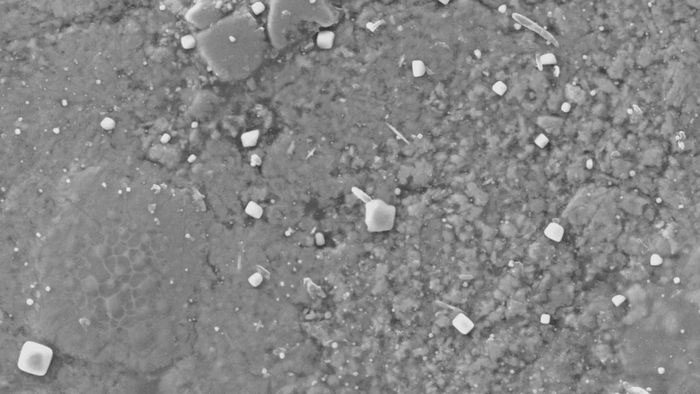A meteorite that fell onto a driveway in Winchcombe, England, was contaminated with table salt within hours of its descent to Earth, extinguishing hopes that it could be a type of primordial space rock.

Table salt found on the Winchcombe meteorite.
The Winchcombe meteorite fragmented and fell onto a driveway leading to a house in Gloucestershire and a nearby sheep field in February 2021. It was collected and stored in sealed bags within hours for the debris found on the driveway and within days for the debris in the sheep field.
However, even with the timely recovery, a recent study indicates that this meteorite began to change due to interactions with the Earth’s atmosphere and surface.
The lead author of the study, Laura Jenkins, a PhD candidate at the School of Geographical and Earth Sciences at the University of Glasgow, stated: “The changes on the ground began as soon as it encountered Earth’s atmosphere, and we could see that in the samples we analyzed just a few months after the meteorite fell.”
Jenkins and her colleagues meticulously examined two fragments (approximately 600 grams): one from the driveway and one from the sheep field—using scanning electron microscopy, Raman spectroscopy, and transmission electron microscopy.
All methods allowed for the identification of tiny minerals on the surface of the meteorite. The research team found both calcium sulfate and calcite—two forms of salt—on the sample from the sheep field and table salt in the sample collected from the driveway. Calcium sulfate and calcite were found on the exterior of the meteorite as it soared through the atmosphere at speeds of tens of thousands of miles per hour.
Jenkins remarked: “It shows how meteorites react to our atmosphere, and we need to be cautious and account for these types of ground changes when analyzing meteorites.”
Co-author of the study, Luke Daly, a lecturer at the School of Geographical and Earth Sciences at the University of Glasgow, stated: “This finding suggests that meteorites should be stored in stable conditions in the laboratory as quickly as possible. Researchers recommend that newly discovered meteorites be preserved in inert gas to minimize reactions.”
The researchers reported their findings on February 9 in the journal Meteorological and Planetary Science.


















































